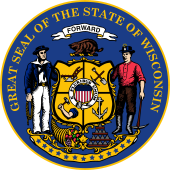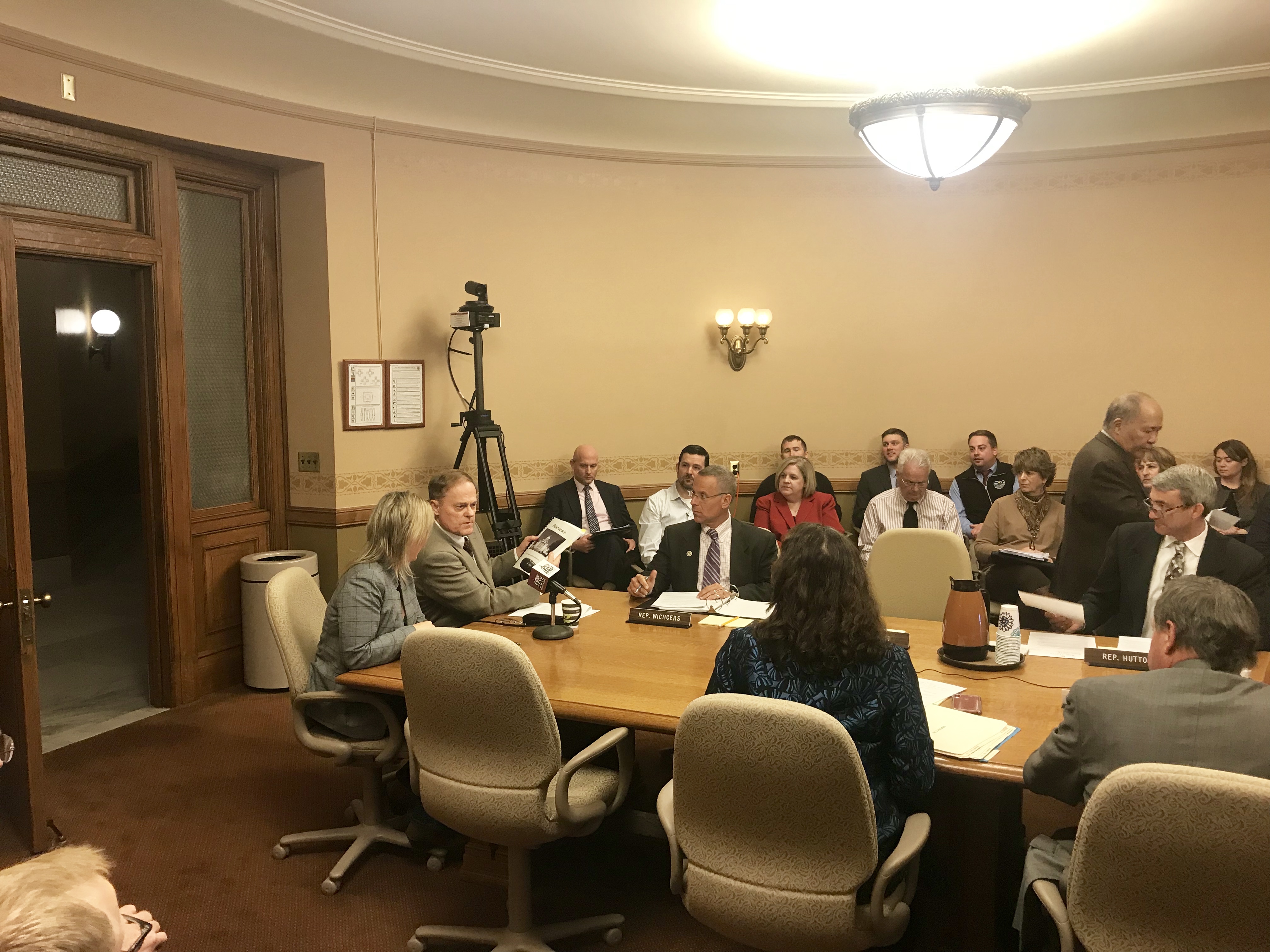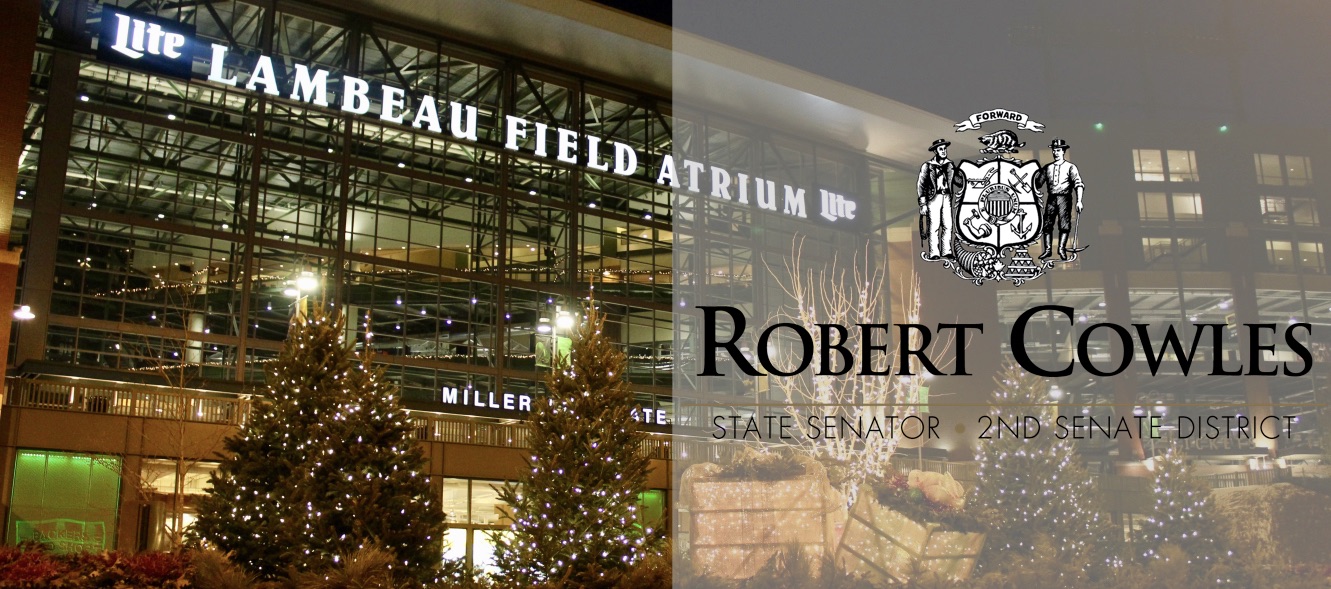|
Robert Cowles
Serving Wisconsin's 2nd Senate District






|
|
Quick Fact |
|
On December 11th, 1833, the first newspaper in
Wisconsin, known as the Intelligencer, was published in
Green Bay.
Learn more facts from our stateís past like this by
visiting the ĎThis Day in Wisconsin Historyí feature of
the
Wisconsin Historical Societyís website.
|
|
Community Events |
|
One of my favorite parts of being your State Senator
is getting to meet constituents out in the community at
some of our great local events.
The 2nd Senate District is also home to many great
events and attractions. Whether you're a visitor or a
life-long resident, you will not run out of things to do
and see in Northeast Wisconsin.
To find an event or attraction in your area, visit the
Greater Green Bay Convention and Visitors Bureau,
the Fox Valley
Convention and Visitors Bureau, the
Shawano
County Chamber of Commerce, or the
Clintonville
Area Chamber of Commerce. To find more public
events, visit the community calendars on
WLUK
News and the
Appleton
Post-Crescent.
|
|
Helpful Links |
|





|
|
|
Dear Friends and Neighbors,
I hope you find yourselves still humming holiday tunes
in your head from an enjoyable Christmas and holiday
season. As the tree comes down in the State Capitol this
week, weíre given a visual reminder that the holiday
season is almost over and the daily hustle and bustle in
the hallways of the State Capitol will pick back up.
Before I begin this e-newsletter, I wanted to take a
moment to wish you a Happy New Year! Good luck with
pursuing any resolutions you set.

In this e-newsletter, youíll find information on:
-
Audits of school safety plans and more released
-
Movement on several bills sets the stage for 2020
-
Redevelopment in Green Bay area gets a boost
-
Latest report reaffirms success of Focus on Energy
-
EPA promotes innovative solutions to water quality
-
Area athletes excel in high school fall sports
-
And more
As always, feel free to
contact my office with any questions or concerns you
may have, and be sure to visit
my website and connect with me on
Facebook,
Twitter, and
Instagram for more regular updates from around the
2nd Senate District and in the State Capitol.
Thanks for reading!

Senator Robert Cowles
Proudly Serving Wisconsin's
2nd Senate District
|
|
Audits of School Safety Plans and More Released |
|
The nonpartisan Legislative Audit Bureau (LAB) released
five new reports in December to round out 2019 with
thirty total audits. As Co-Chair of the Joint
Legislative Audit Committee, itís my responsibility to
take the work prepared by these award-winning financial
and program evaluators and turn their findings, when
necessary, into action. This may be done through
legislation, but often is completed through continual
follow-up, often over the course of years, with the
agency. But before anything else, I need to read and
understand the reports.
The first report released this month evaluated
state-owned residential properties (Report
19-26). The state Department of Administration (DOA)
is required to administer residential properties, which
are managed by state agencies, with the Department of
Natural Resources having 32 properties and the UW-System
having 114 properties, and are leased to state
employees, typically as part of their employment.
LAB found that DOA did not comply with all statutory
requirements, did not track all properties for which it
was statutorily responsible, and did not monitor state
agency compliance with its policies, which had not been
revised since 1975. Although
DOA is statutorily required to conduct appraisals of
these properties every ten years, the last appraisals
were conducted in 1995. We will definitely be working
with these state agencies to bring these properties and
their policies back into statutory compliance.
Read the full press release from my Co-Chair,
Representative Samantha Kerkman (R-Salem), and I on this
audit on
my website, or check-out
this story from the Associated Press to learn more.
The second audit was the second annual evaluation of the
Wisconsin Economic Development Corporationís (WEDC)
process for verifying tax credit information submitted
by Foxconn (Report
19-27). In 2019, WEDC did not award any program tax
credits because Foxconn did not create the minimum
number of jobs. LAB found WEDCís written procedures
continue to allow WEDC to award program tax credits for
the wages paid to employees for services not performed
in Wisconsin. LAB recommends that WEDC revise its
procedures to ensure compliance with statutes and its
contract.
While the written procedures were changed to attempt to
address the finding in the 2018 report, the change
doesnít accurately reflect the statutory requirement.
I hope that, in WEDCís next
follow-up, their written procedures will explicitly
require it to award credits for only wages paid for
services performed in Wisconsin.
Read the full press release from my Co-Chair and I on
this audit on
my website.
The third audit and final audit Iíll discuss reviewed
school safety grants and plans (Report
19-28). 2017 Wisconsin Act 143, which I supported,
appropriated $100 million to the Department of Justice
(DOJ) in fiscal year 2018-19 for awarding school safety
grants to school districts and other schools. LAB
reviewed DOJís files for a sample of 70 grants that
totaled $17.6 million, or 18.6% of the total amount of
all grants awarded. LAB found that DOJ had appropriately
administered and overseen these 70 grants.
To determine best practices for school safety, LAB
reviewed DOJís online resources and documents from
around the nation. LAB also directly distributed the
report to every school district and school that was in
operation in Wisconsin as of June 2019. LABís review of
the 779 submitted school safety plans found a number of
examples of best practices in emergency prevention and
mitigation, emergency preparedness, response and
recovery, school safety assessments, school safety
drills, and school building blueprints.
This is a great example of a
functional audit. In distributing this report around the
state, LABís review of best practices in all of the
submitted school safety plans will further help other
schools refine and improve their school safety plans
into the future. I believe that the items for
legislative consideration would further improve and
strengthen this program by adding accountability and
continuous review of the school safety plans.
Read the full press release from my Co-Chair and I on
this audit on
my website, or check-out
this story from the Associated Press to learn more.
The fourth report released this month and final audit
Iíll discuss evaluated the State of Wisconsinís
financial statements from fiscal year 2018-2019 (Report
19-30). This audit evaluates the stateís
Comprehensive Annual Financial Report, and LAB found
that the report was completed using generally accepted
accounting principles. The evaluation also found an over
$500 million reduction in the deficit and a $500 million
decrease in the stateís long-term debt; both of which
are great news!
LAB did identify one material weakness in the Injured
Patients and Families Compensation Fund and four
significant deficiencies, including three related to
information technology security at DOA. Earlier this
year, I advocated to start an audit of IT procurement,
but thatís only part of the IT picture.
This isnít the
first time LAB has identified concerns with IT security
in our state government, and itís time for DOA and other
agencies to ensure these findings donít appear again.
The fifth audit, which I wonít go into detail on given
that the findings are less notable, evaluated the State
Investment Fund (Report
19-29).
|
|
Movement on Several Bills Sets the
State for 2020 |
|
Itís been a busy few weeks thanks to progress on a
number of bills Iíve authored. This helps to set the
stage for even more progress in 2020. The efforts
Iíve been working on range a number of different
topics, but each of which has a tie back to
Northeast Wisconsin. Some of this movement includes:
-
Senate Bill 512 was heard and unanimously
recommended for passage by the Senate Utilities and
Housing Committee. This bill, which Iíve authored
with Representative Joel Kitchens (R-Sturgeon Bay),
establishes a process that gives unit owners a seat
at the table in a dispute with a condominium
association. This legislation resulted from contacts
by several constituents and will help to protect
their rights as property owners.
-
Senate Bill 90 and
Assembly Bill 173 were both heard by committees,
and AB 173 was unanimously recommended for passage.
Wisconsinís state government has a strong tradition
of accountability and transparency. This bill, which
Iíve authored with Representative Samantha Kerkman
(R-Salem), creates a state Tax Accountability
Dashboard which can better inform the public
discourse by providing an accessible, clear, and
upfront series of graphics so taxpayers will know
where their money goes.

-
Assembly Bill 323 was recommended for passage on
a bipartisan vote by the Assembly Committee on
Environment. This legislation, which Iíve authored
with Representative John Nygren (R-Marinette),
strikes a balance by reducing the environmental
footprint and the risk to the human health of PFAS
contamination while not hamstringing first
responders from using this lifesaving product in
emergency situations.
-
Assembly Bill 473 was heard by the Assembly
Education Committee. When voters in Freedom turned
down a referendum for a new building, they never
knew that ripple effects would cause the School
District to lose part of their state aid.
Representative Jim Steineke (R-Kaukauna) and I are
working together on this legislation to restore that
state aid moving forward.
-
Assembly Bill 237 was heard by the Assembly
Workforce Development Committee. A groundbreaking by
WEC, the announcement by Alliant, and grand openings
on community solar projects are just some of the
major developments in renewables over the past few
months. Despite this exciting progress, one of the
key roadblocks we face in expanding our stateís
renewable energy generation is more skilled workers
in this space. Thatís why Iíve authored this
legislation with Representative Mike Kuglitsch
(R-New Berlin) to help train more workers in
renewable energy installation, repair, and
maintenance.
|
|
Redevelopment in Green Bay Area Gets a Boost |
|
When developers are looking for prime parcels for their
next projects, they often are left with only two
options: look beyond city limits or look within the
community at properties that have seen better days.
These run-down and under-used parcels can often present
unique opportunities including more desirable locations,
but these properties also come with distinct challenges.
To unlock the full potential of redevelopment within our
communities, partnerships with local governments and the
state are not only helpful, but often may be necessary.
The award of two state grants to the Villages of
Ashwaubenon and Allouez will help to promote the
redevelopment of blighted properties in these
communities.
Ashwaubenon was awarded $476,000 from the Wisconsin
Economic Development Corporationís Idle Sites
Redevelopment Program to assist with the expense of site
preparation at a blighted parcel located on South
Broadway. I wrote a letter in support of this project.
Allouez was awarded approximately $29,900 from the
Department of Natural Resourcesí Wisconsin Assessment
Monies grant program to assist with the expense of
studies to identify and determine the extent of any soil
and groundwater contamination at a site located on South
Webster.
By redeveloping underutilized parcels with the help
provided by these competitive state grant programs, we
can grow property values, provide new employment
opportunities, create new sources of property taxes that
may offset some of the burden on residential property
owners, develop new amenities for community members, and
spur additional economic development. I applaud the
leadership of the local governments in Ashwaubenon and
Allouez in reaffirming their commitment to advancing
their communities and the entire region by utilizing
these high-value, yet blighted parcels.

|
|
Latest Report Reaffirms Success of Focus on Energy |
|
A recent four-year summary of the Focus on Energy
program reaffirmed the success of this important
energy efficiency program. Highlights from the
report of this four-year period include substantial
increases in small business and rural residential
participation. By helping residents and businesses
become more energy efficient, Focus can create jobs,
spur economic development, and improve environmental
quality throughout our state.
The report also showed high levels of customer
satisfaction and energy savings that helped to avoid
28 million tons of carbon dioxide emissions. Thatís
the equivalent of taking six million cars off the
road for an entire year! From supporting projects in
buildings as large as the lighting, boilers, and
HVAC system at Lambeau Field and as small as your
bedside lamp, Focus has shown itself to be an
accessible program for all Wisconsinites.

|
|
EPA Promotes Innovative Solutions to Water Quality |
|
Recently, Region 5 of the federal Environmental
Protection Agency (EPA) announced $11.5 million in Great
Lakes Restoration Initiative grants to Midwestern
states. Among the recipients were Green Bay Metropolitan
Sewerage District (NEW Water) which received $338,438
for buffers on ephemeral headwaters in Fox River
sub-watersheds; an adaptive management technique to
improve water quality in a region without the over
burdensome expense of massive infrastructure upgrades
that provide minimal impacts. This approach by NEW Water
is in line with market-based approaches for nutrient
reductions that includes water quality trading.
While few examples of water quality trades, including
one at Heart of the Valley Metropolitan Sewerage
District in Kaukauna, currently exist in Wisconsin, a
new approach, 2019 Senate Bill 91, will help to promote
more of these market-based approaches to water quality
in Wisconsin. Iíve authored this legislation, better
known as P3: Wisconsinís Trading Marketplace to
Establish More Pollution Prevention Partnerships, with
Representative Joel Kitchens (R-Sturgeon Bay) and
Senator Jerry Petrowski (R-Marathon). P3 has fostered
the support of over 30 groups. This legislation awaits a
vote in the full Assembly before it may advance to the
Governorís desk for his signature.
This current announcement by EPA demonstrates their
clear commitment towards helping the State of Wisconsin
implement the nationís first statewide water quality
trading marketplace. Iím glad to have it reaffirmed that
EPA will be a partner, not a problem, when we implement
this legislation.

|
|
Area Athletes Excel in High School Fall Sports |
|
As area students enjoy a much earned break, the fall
high school sports season has come to a close. While
every student who takes time out of their day to join a
sports team or other extra-curricular activity should be
proud of their dedication and achievements, I wanted to
take a moment in this e-newsletter to congratulate those
from the 2nd Senate District who excelled in the fall
sports season and qualified for the State Championships
in their respective sports.
Ashwaubenon High School
-
Girls Swimming and Diving: Bry Bellile, Hallory
Domnick (State Champion in the 500 yard freestyle!),
Evelyn Geurts, Jocelyn McNicoll, and Sydney Popp
Bay Port High School
-
Football
-
Girls Golf: Individual Jo Baranczyk State Champion
-
Girls Swim and Dive: Emma Lasecki State Champion in
the 200 Yard IM, Emma Lasecki State Champion in 100
Yard Butterfly
Freedom High School
-
Boys Cross Country Team
-
Girls Cross Country Team
|
|
In Other News... |
|
Here are some other stories I wanted to share with
you:
-
Congratulations to two employers from the 2nd Senate
District, Fox Valley Wood Products of Kaukauna and
MCL Industries of Pulaski, on
being nominated for Wisconsin Manufacturers and
Commerceís Manufacturer of the Year Awards!
-
Winter Free Fishing Weekend is coming up! This
annual event,
taking place this year on January 18th and 19th,
is the perfect opportunity for a seasoned ice
fisherman or woman to introduce friends and family
to the basics of this Wisconsin winter tradition.
-
Legislation Iíve worked on that was recently signed
into law could benefit the Green Bay areaís first
wetland bank. These banks not only serve as
mitigation for unavoidable wetland impacts during
development, but they filter groundwater, store
floodwater, offer wildlife habitat, and more! Read
more on the
Press Timeís website.
-
I was excited to learn of Green Bay Packagingís
recent announcement that, not only are they on
track for an early 2021 opening of the first new
paper mill in Wisconsin in three-decades, but by
shutting down a coal boiler, theyíre cutting air
emissions by 90%!
-
Great work by Fox Valley Technical College to
rapidly adopt a new state law I supported which
requires that students training to be truck drivers
receive some training on how to spot the warning
signs of human trafficking.
This training will ensure that truck drivers can
spot the warning signs of human trafficking when
they stop at truck stops in Wisconsin and beyond.
-
Brad Smith, an Appleton native and the CEO of
Microsoft, was recently
covered by the Business Journal during a
fireside chat he took part in while in Milwaukee.
While at the forefront of the tech world, Smith
hasnít lost touch with his Northeast Wisconsin
roots.
-
Some Wisconsin State Parks will be hosting
candlelight ski and hiking events this winter. This
long-running tradition offers residents and visitors
the opportunity to see some of our stateís best
natural treasures in a new light. Learn more on the
DNRís website.
|
|

